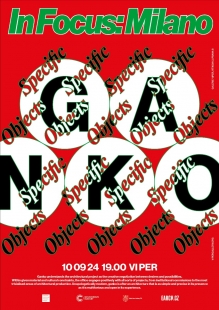
Ganko: Specific Objects - lecture at Gallery VI PER
In Focus: Milan
Source
Galerie VI PER
Galerie VI PER
Publisher
Tisková zpráva
07.09.2024 19:10
Tisková zpráva
07.09.2024 19:10
Lectures
Czech Republic
Prague
Karlín
Guido Tesio
Nicolà Munaretto
ganko
Ganko understands architectural design as a creative negotiation between desires and possibilities. Within the given material and cultural constraints, the office positively engages in a variety of projects, from institutional commissions to the most mundane areas of architectural production. Ganko is undoubtedly modern and strives for architecture that is as simple and precise in its presence as it is multifaceted and open in its experience.
Ganko is an architectural studio founded in 2017 by Nicolà Munaretto and Guido Tesio after previous experiences in Brussels, Lausanne, Beijing, and Basel. In recent years, it has established itself as one of the most interesting studios on the Italian scene and has gained prestigious awards in many public and private international competitions. Recently, they received second prize in the competition for a new hall in Tivoli, second prize in the competition for the expansion of the Museo del Novecento in Milan, fifth prize in the competition for new laboratories at Teatro alla Scala in Milan, first prize in the competition for two squares and a new civic center in Bergamo, and first prize in the competition for a new hall in Brescia. In parallel with their professional activities, Ganko actively participates in research and education; in Italy at the Milan Polytechnic and in Switzerland at the Academy of Architecture in Mendrisio. https://ganko.it/
Nicolà Munaretto (Bergamo, 1984) graduated from the Milan Polytechnic. Before founding Ganko, he worked as an architect for Studio Bertasa (Bergamo), Onsitestudio (Milan), and AL30 Architectes (Lausanne). In parallel with his professional practice, he is currently an assistant at the Polytechnic in Milan.
Guido Tesio (Milan, 1984) graduated from the Milan Polytechnic. Before founding Ganko, he worked as an architect for Baukuh (Milan), OFFICE Kersten Geers David Van Severen (Brussels), ZAO/standardarchitecture (Beijing), and Christ & Gantenbein (Basel). He is currently a doctoral student at the Academy of Architecture in Mendrisio and an assistant at the Polytechnic in Milan.
Curator of the series: Miroslav Pazdera.
The project was created with the financial support of the State Culture Fund of the Czech Republic.
Ganko is an architectural studio founded in 2017 by Nicolà Munaretto and Guido Tesio after previous experiences in Brussels, Lausanne, Beijing, and Basel. In recent years, it has established itself as one of the most interesting studios on the Italian scene and has gained prestigious awards in many public and private international competitions. Recently, they received second prize in the competition for a new hall in Tivoli, second prize in the competition for the expansion of the Museo del Novecento in Milan, fifth prize in the competition for new laboratories at Teatro alla Scala in Milan, first prize in the competition for two squares and a new civic center in Bergamo, and first prize in the competition for a new hall in Brescia. In parallel with their professional activities, Ganko actively participates in research and education; in Italy at the Milan Polytechnic and in Switzerland at the Academy of Architecture in Mendrisio. https://ganko.it/
Nicolà Munaretto (Bergamo, 1984) graduated from the Milan Polytechnic. Before founding Ganko, he worked as an architect for Studio Bertasa (Bergamo), Onsitestudio (Milan), and AL30 Architectes (Lausanne). In parallel with his professional practice, he is currently an assistant at the Polytechnic in Milan.
Guido Tesio (Milan, 1984) graduated from the Milan Polytechnic. Before founding Ganko, he worked as an architect for Baukuh (Milan), OFFICE Kersten Geers David Van Severen (Brussels), ZAO/standardarchitecture (Beijing), and Christ & Gantenbein (Basel). He is currently a doctoral student at the Academy of Architecture in Mendrisio and an assistant at the Polytechnic in Milan.
Curator of the series: Miroslav Pazdera.
The project was created with the financial support of the State Culture Fund of the Czech Republic.
The English translation is powered by AI tool. Switch to Czech to view the original text source.

0 comments
add comment











